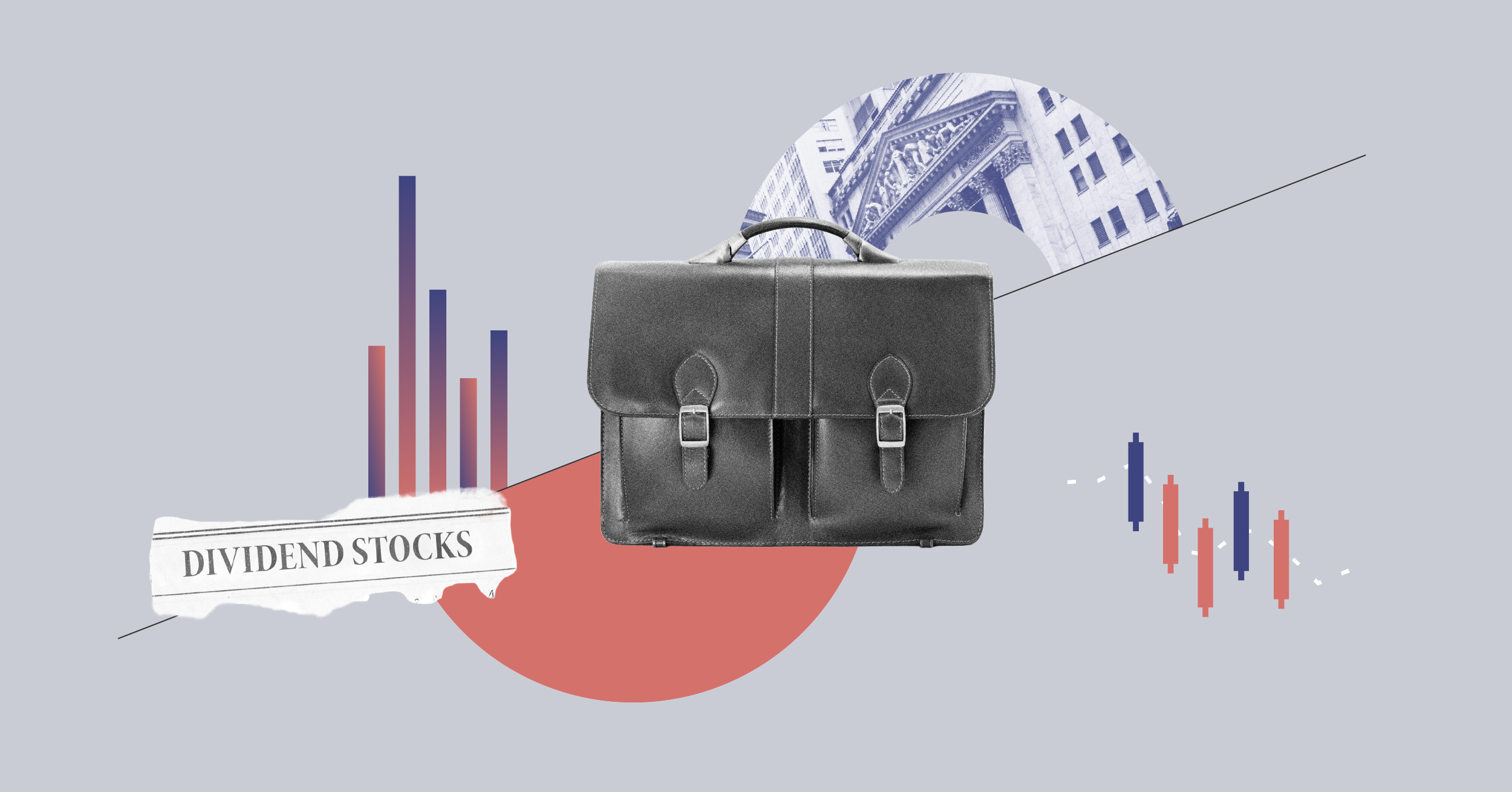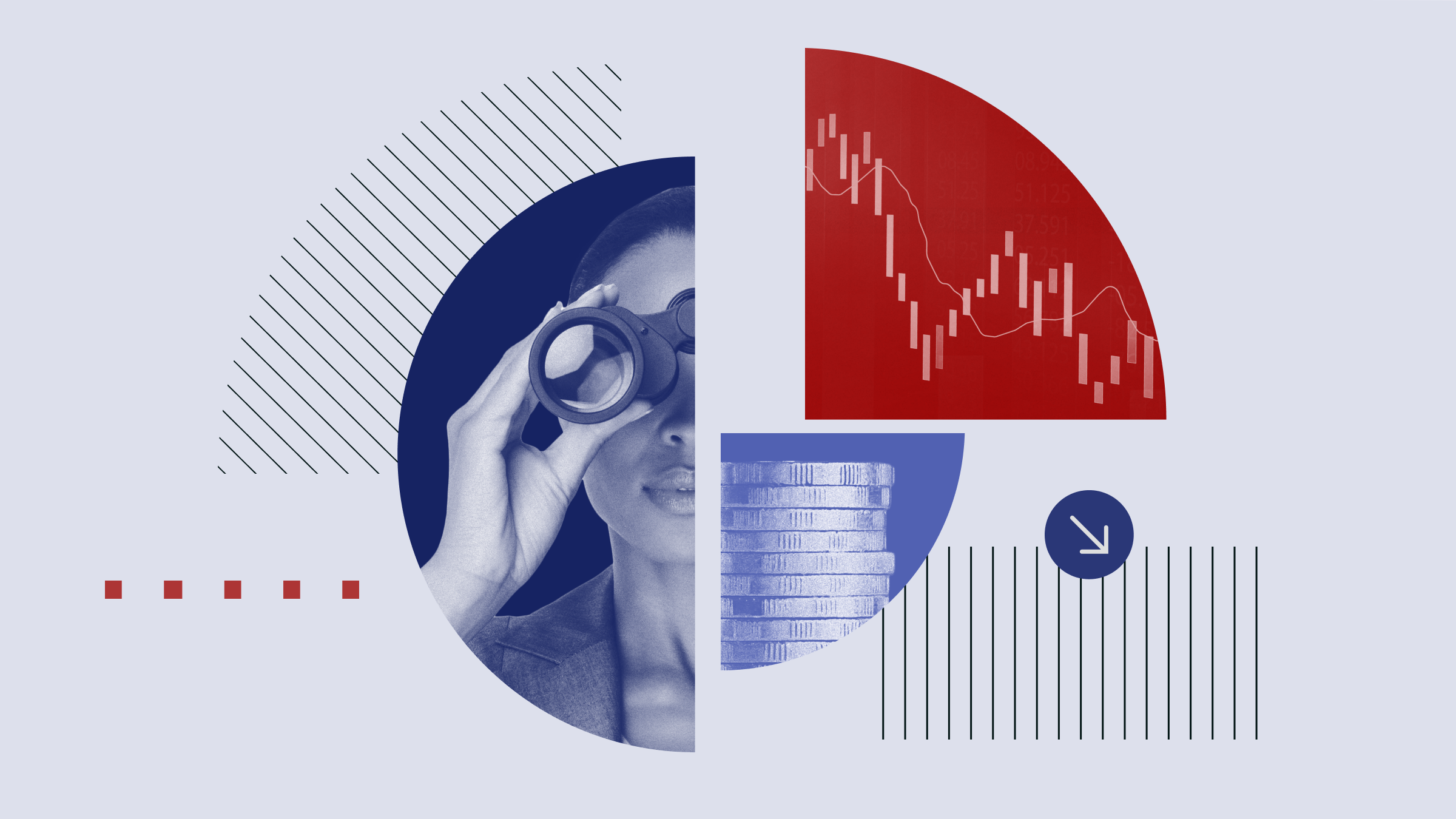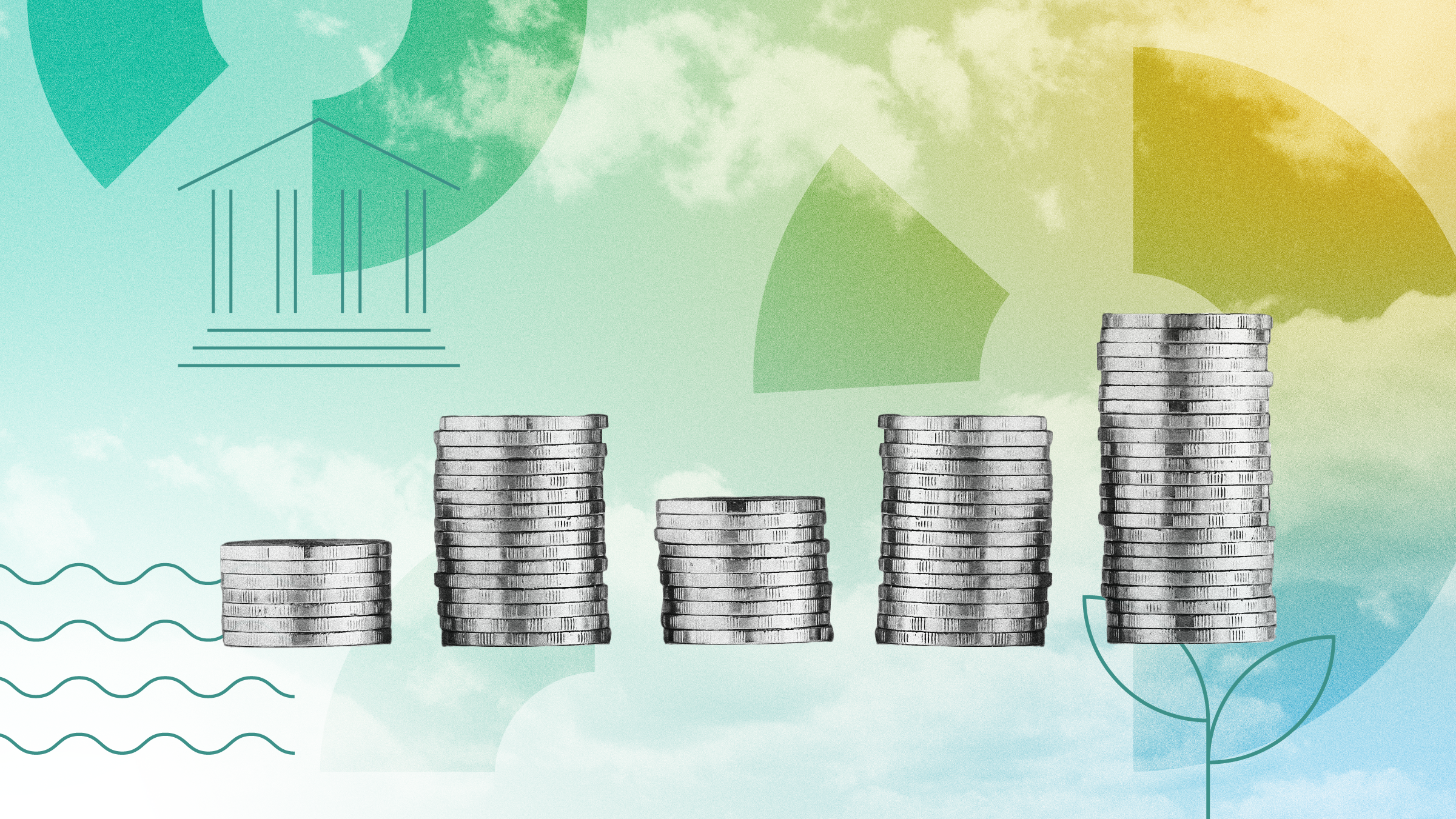
In the last quarter of 2024, Article 8 environmental, social, and governance open-end funds and exchange-traded funds recorded EUR 52 billion in net inflows, the highest quarterly intake of 2024, and the largest since late 2021.
The Sustainable Finance Disclosure Regulation classifies all funds in the EU as either Article 6, 8, or 9, describing different levels of sustainability. Article 8 funds, also called “light green” funds, promote environmental and/or social characteristics. Article 9 funds, or “dark green” funds, have a sustainable-investment objective. Funds within the scope of the SFDR that are neither Article 8 nor Article 9 are Article 6 funds.
Redemptions from Article 9 funds persisted for the fifth consecutive quarter as investors pulled out a record EUR 7.3 billion, compared with EUR 3.0 billion in the prior quarter.
By comparison, the rest of the EU fund market, represented by Article 6 funds, continued to dominate flows, attracting about EUR 85.0 billion in net subscriptions during the fourth quarter, building on the EUR 82.5 billion garnered in the previous three months.
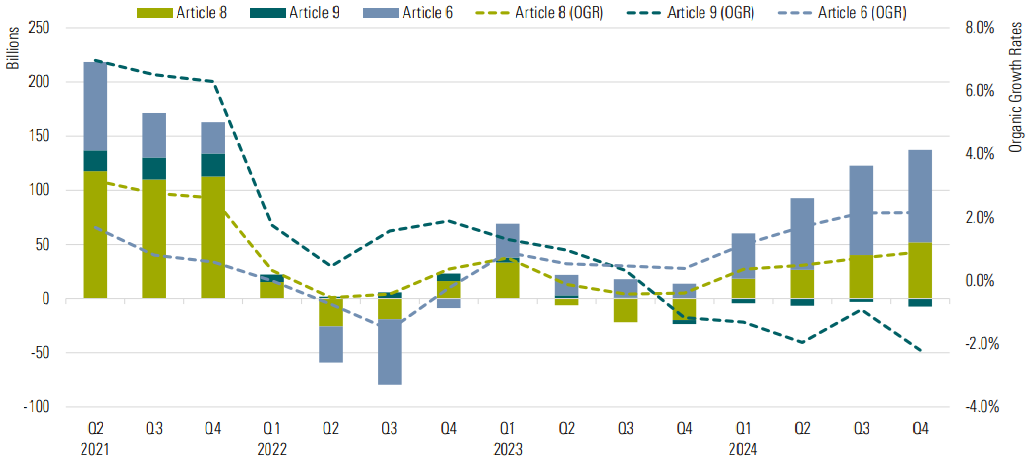
Overall, investor sentiment toward Article 8 and Article 9 funds was mixed last year, shaped by elevated interest rates, geopolitical risks, greenwashing accusations, and regulatory uncertainty.
Fixed-income funds were the main beneficiaries of Article 8 funds’ inflows. As inflationary pressures remained subdued and the market priced in modest rate cuts, bonds offered an attractive balance between carry and yield stability. By contrast, equity funds in the Article 8 and Article 9 categories experienced net redemptions. In the 2024 bull market, investors simply preferred conventional equity strategies.
Active Article 8 Funds Recover
Actively managed Article 8 fund flows continued their recovery, attracting a net EUR 36.3 billion—their best quarter since late 2021. Passively managed Article 8 funds also maintained steady growth with EUR 15.7 billion in inflows.
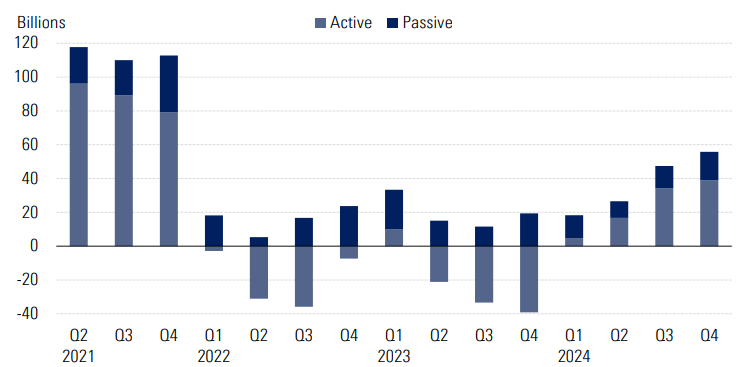
However, active Article 9 funds continued to struggle, experiencing record outflows of EUR 9.7 billion, reflecting investors’ reduced appetite for active dark green strategies, in a context of underperformance. Passive Article 9 funds, however, bucked the trend, posting a modest net inflow of EUR 2.0 billion.
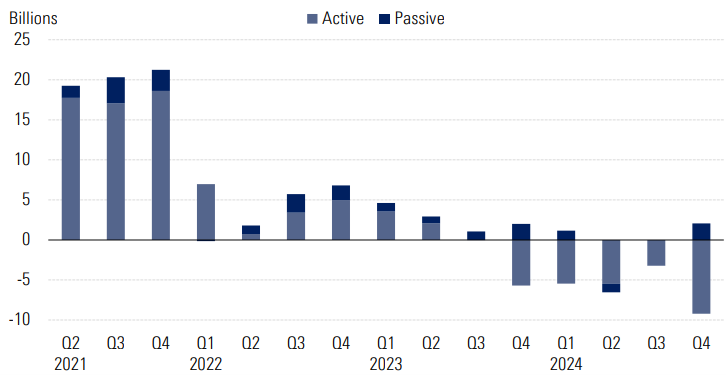
Article 8 and Article 9 Fund Assets Rise to a Record EUR 6.1 Trillion
Combined assets in Article 8 and Article 9 funds reached EUR 6.1 trillion, accounting for 60% of the total EU fund market. This marks a slight increase from the previous quarter as inflows into Article 8 funds helped offset continued redemptions from Article 9 products.
This absolute and relative increase in Article 8 and Article 9 assets can be partly explained by the continued product reclassification from Article 6 to Articles 8 or 9.
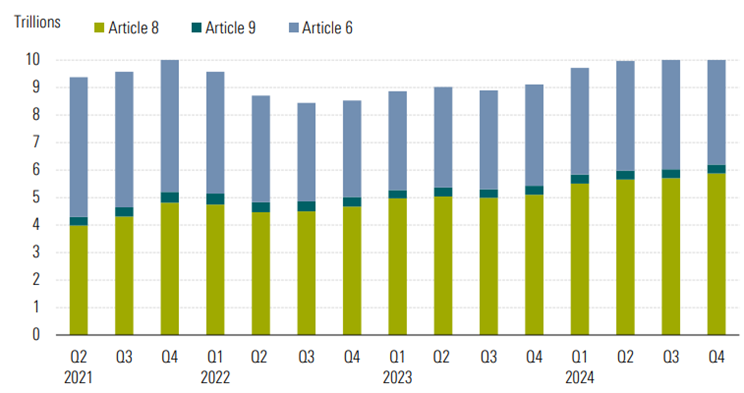
While active strategies continue to dominate both Article 8 and Article 9 fund universes, passive strategies saw their market share grow further in the fourth quarter. They now account for 12.5% of Article 8 fund assets and nearly 17.0% of Article 9 fund assets. The expansion of ESG ETFs and index funds has been an ongoing trend as investors seek low-cost exposure to sustainable investments. Sizable funds tracking Paris-aligned and climate-transition benchmarks have largely contributed to the growth of passive strategies in both Article 8 and Article 9 fund universes.
A Large Number of Name Changes on the Horizon
In 2024, in addition to fund launches (802) and closures (521), the landscape of Article 8 and Article 9 products has also been shaped by rebranding activity as indicated by changed fund names. Over 170 funds changed names during the full year, with many removing or altering ESG-related terms.
Product rebranding activity accelerated in the last three months of the year. Over that period, asset managers rebranded at least 65 Article 8 and Article 9 funds to comply with the European Securities and Markets Authority’s upcoming guidelines on fund names. ESMA’s guidelines aim to protect investors against greenwashing risk and provide minimum standards for funds that use specific ESG terms in their names.
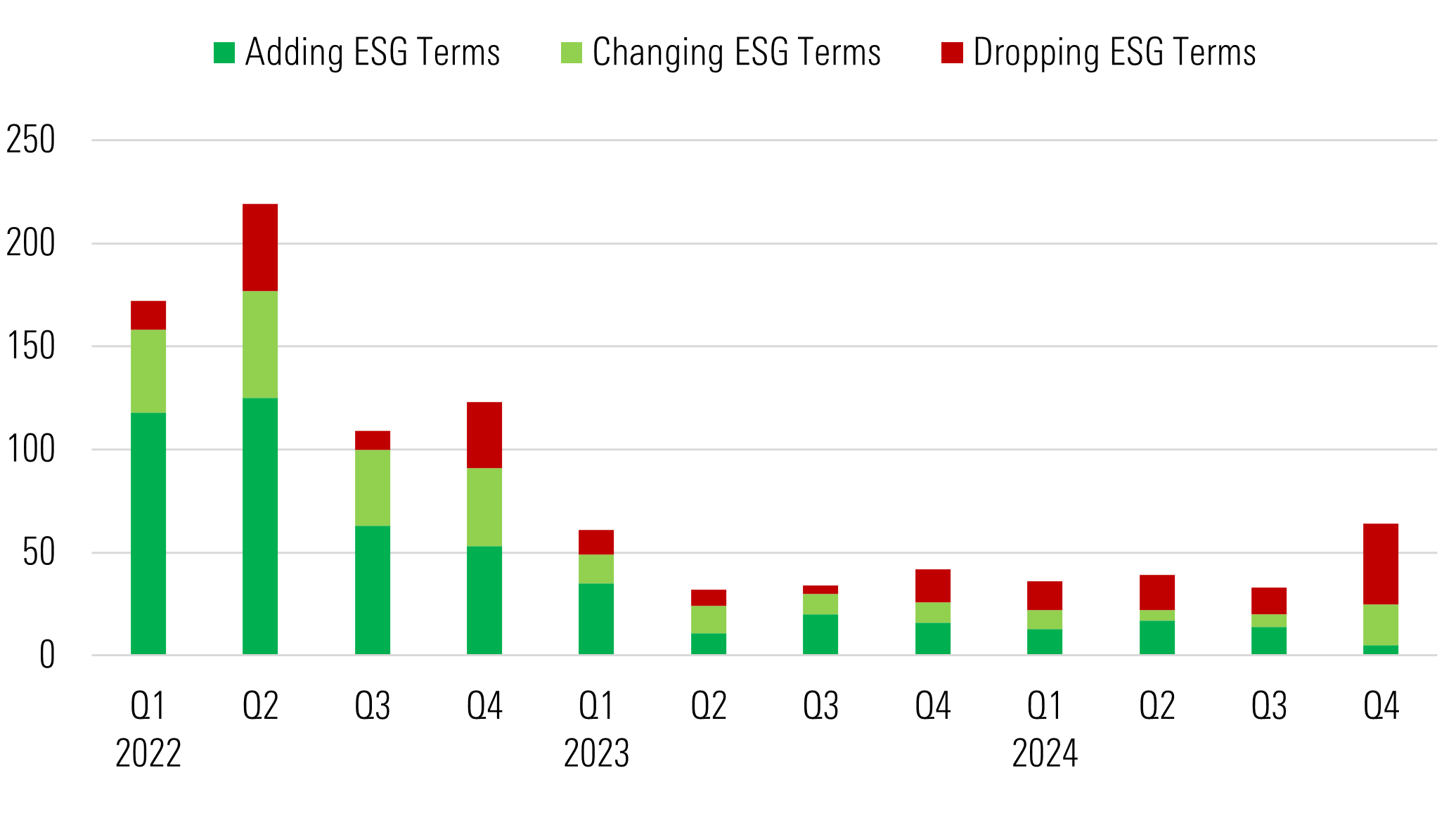
Based on our analysis of the data, knowledge of the various strategies, and conversations with asset managers, we anticipate that between 30% and 50% of EU ESG funds will change names in the coming months, representing between 1,200 and 2,200 funds. Changes will include ESG-related term removals, additions, and swaps, but also mergers (small and underperforming funds could merge with other ESG or non-ESG funds).
Some asset managers have taken the opportunity of the ESMA guidelines to perform a complete review of their fund ranges and how they segment their product offerings. For some, fund name changes will affect 100% of their ESG fund ranges, while for others, rebranding will be limited as they have already made changes in the recent past or most of their portfolios just require small adjustments. Some managers have also taken this opportunity to enhance the sustainability characteristics of certain strategies and simplify their ESG fund ranges.
Fund name changes will mostly affect funds that use terms such as “sustainable” or “ESG” in their names which, for various reasons, will not want to adjust existing investment objectives and portfolios and apply the stringent criteria required to keep these terms, starting with the fossil fuel exclusions imposed by the Paris-aligned benchmark regulation.
More Climate Transition Funds on the Horizon
We also anticipate an increase in the popularity of ESG-related terms that emphasize transitional aspects as investors increasingly look to align their portfolios with real-world outcomes and, in the context of climate change, with real-world decarbonization. Examples of funds that have added or swapped such ESG key terms include Templeton European Sustainability Improvers (formerly known as Templeton European Dividend), Allspring Climate Transition Global Equity (formerly known as Allspring 2 Degree Global Equity), and Man Global Climate Transition Impact Bond (formerly known as Man Global Climate Impact Bond).
To check out the full report on SFDR Article 8 and Article 9 Funds: Q4 2024 in Review, click here.
The author or authors do not own shares in any securities mentioned in this article. Find out about Morningstar's editorial policies.









